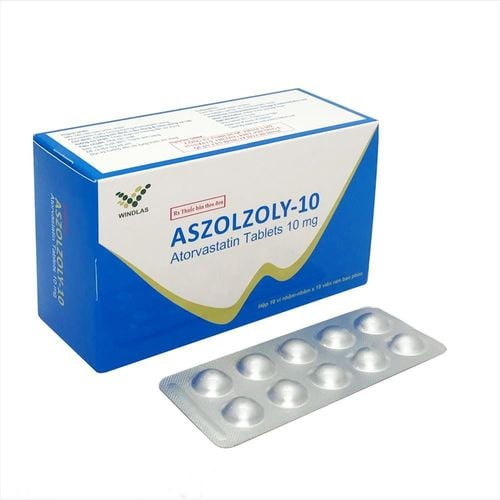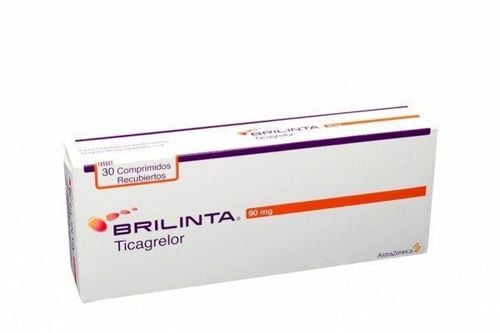This is an automatically translated article.
Agisimva 20 is a drug used in the treatment of hypercholesterolemia, atherosclerosis, and prevention of coronary events.1. What is Agisimva 20?
Agisimva has the main active ingredient is Simvastatin, the drug is prepared in the form of film-coated tablets with a strength of 20mg. Simvastatin competitively inhibits hydroxy methylglutaryl coenzyme (HMG - CoA) reductase, preventing the conversion of HMG - CoA to mevalonate - a precursor of cholesterol. Simvastatin inhibits cholesterol biosynthesis, reducing cholesterol in hepatocytes. Simvastatin stimulates LDL receptor synthesis, increasing the transport of LDL from the blood, thereby reducing plasma cholesterol concentrations.
All statins are very effective at lowering LDL cholesterol levels. Statin drugs lower LDL cholesterol by 25% to 45%, depending on the dose. Statins increase HDL cholesterol levels by 5–15%, lowering LDL/HDL and total cholesterol/HDL ratios. Statins lower plasma triglycerides to a lesser extent (10 - 30%) by increasing clearance of residual VLDL by upregulation. Response to statins can be seen within 1 to 2 weeks of initiation of therapy and is maximal within 4 to 6 weeks. Treatment response was maintained throughout long-term treatment.
2. Indications and contraindications for taking Agisimva 20mg
2.1 Indications Treatment of hypercholesterolemia: Agisimva is an adjunct to dietary therapy to reduce total cholesterol and LDL cholesterol levels in patients with primary hypercholesterolemia, however, the drug reduces triglycerides little. Primary prevention (level 1) of coronary events: in patients with hypercholesterolemia without clinically evident coronary heart disease, Agisimva is indicated to reduce the risk of myocardial infarction and death from heart disease. and limit the risk of interventional coronary revascularization procedures. Atherosclerosis: In patients with hypercholesterolemia with clinical manifestations of coronary artery disease, including previous myocardial infarction, Agisimva 20mg is indicated to slow the progression of coronary atherosclerosis and reduce the risk of events. acute coronary artery. 2.2 Contraindications Allergy or hypersensitivity to Simvastatin or any of its ingredients. Active liver disease or persistent elevations of liver enzymes of unknown cause. Do not use Agisimva 20mg in combination with strong CYP 3A4 inhibitors such as: Itraconazole, Erythromycin, Ketoconazole, Clarithromycin, Telithromycin, HIV protease inhibitors, Boceprevir, Cyclosporin, Nefazodon, Posaconazole, Telaprevir, Gemfibrozil, Danazol. Pregnant women Women who are breastfeeding.
3. How to take Agisimva 20mg
3.1 Dosage Agisimva 20mg is taken orally, taken in the evening on an empty stomach.
Initial dose: 5-10mg x 1 time / day. Adjust dose every 4 weeks. Maintenance dose: 5-40mg x 1 time/day. 3.2 Note Before using Agisimva 20mg, patients should have a standard low cholesterol diet and continue to maintain this diet throughout the treatment period.
Do not drink large amounts of grapefruit juice (> 1 liter / day)
Do not take more than 10mg Simvastatin / day when used concomitantly with Verapamil, Dronedaron, Diltiazem.
Do not use more than 20mg Simvastatin/day when used concomitantly with Amlodipine, Ranolazine, Amiodarone.
3.3. Overdose and management The dose of Agisimva in excess of 400mg does not cause any side effects other than the possible undesirable effects. If symptoms of overdose appear, stop using Agisimva and take the patient to a medical facility for timely treatment. Patients should be monitored for at least 10 hours, symptomatic and supportive treatment is the mainstay.
4. Undesirable effects when using Agisimva 20mg
During treatment with Agisimva, you may experience some of the following side effects:
Digestive, common: nausea, abdominal pain, flatulence, diarrhea, constipation. Central nervous system: headache, dizziness, blurred vision, insomnia, asthenia, cognitive impairment (such as memory loss, confusion) may occur but rarely. Musculoskeletal: musculoskeletal pain, myopathy (combined muscle weakness and increased plasma creatine phosphokinase); myositis, rhabdomyolysis leading to acute renal failure secondary to myoglobinuria. The elevation of liver enzymes is transient and reversible upon discontinuation of the drug. Increased blood sugar. Other less common side effects: skin rash, rhinitis, pharyngitis, sinusitis, cough.
5. Some notes when using Agisimva 20mg
Before using Agisimva 20mg, it is necessary to rule out other causes of hypercholesterolemia such as hypothyroidism, nephrotic syndrome, poorly controlled diabetes, blood protein disorders, drug-induced liver disease or alcoholism.
Quantification of total cholesterol, HDL cholesterol, LDL cholesterol and triglycerides. Carry out periodic lipid quantification at intervals of not less than 4 weeks. Adjust the dose of Agisimva according to the patient's response. The goal of treatment is to lower LDL cholesterol thus using LDL cholesterol levels to initiate and assess treatment response. Use total cholesterol only for monitoring treatment when LDL cholesterol testing is not available.
Conduct liver enzyme tests before and possibly after taking Agisimva because of the risk of elevated liver enzymes during treatment.
In case of acute myopathy or risk factors for acute renal failure due to rhabdomyolysis (surgery and major trauma, severe acute infection, hypotension, metabolic, endocrine, electrolyte abnormalities or uncontrolled convulsions), Agisimva should be discontinued.
Pregnant women: the drug reduces cholesterol synthesis and may affect the synthesis of many biologically active substances derived from cholesterol, so Agisimva may affect the fetus. Agisimva is contraindicated in pregnant women. Use with caution only in very high blood cholesterol that has not responded to other drugs.
Lactating women: It is not known whether Agisimva is excreted in breast milk, however studies have shown that certain other drugs of the same class are excreted in breast milk. Therefore, the possibility that the drug may cause undesirable effects in nursing infants cannot be excluded. Agisimva is contraindicated in this population.
Driving and operating machines: side effects of the drug include headache, dizziness, cognitive impairment, blurred vision. Caution should be exercised when administering Agisimva to drivers and operators of machinery.
Monitor Creatinine kinase (CK) in some cases:
Before starting treatment, a CK test should be done in the following cases: impaired renal function, hypothyroidism, personal or family history of the disease hereditary myopathy, elderly patients (>70 years) with risk factors for rhabdomyolysis, history of myopathy due to statin or fibrate use, history of liver disease, heavy alcohol consumption. It is necessary to weigh the benefits and risks when using Agisimva in these subjects. Do not use the drug when the CK test is >5 times the upper limit of normal. During the use of Agisimva, if you experience muscle symptoms such as muscle pain, stiffness or weakness, you should notify your doctor and conduct a CK test for timely treatment.
6. Drug interactions
No clinically significant adverse interactions were observed when Simvastatin was co-administered with angiotensin-converting enzyme inhibitors, calcium channel blockers, beta blockers, diuretics and non-steroidal anti-inflammatory drugs.
Warfarin: Simvastatin may increase the effects of the drug.
Increased risk of muscle damage when Agisimva is used concurrently with the following drugs: Gemfibrozil, other fibrate-lowering cholesterol, high-dose Niacin (> 1 g/day), Colchicine.
Drugs for HIV and Hepatitis C: Concomitant use with lipid-lowering drugs of the Simvastatin group increases the risk of muscle damage, rhabdomyolysis, renal failure and possibly death.
Bile acid binding resins reduce the bioavailability of Simvastatin when administered concomitantly. The time to use these two drugs must be far apart.
Please dial HOTLINE for more information or register for an appointment HERE. Download MyVinmec app to make appointments faster and to manage your bookings easily.













